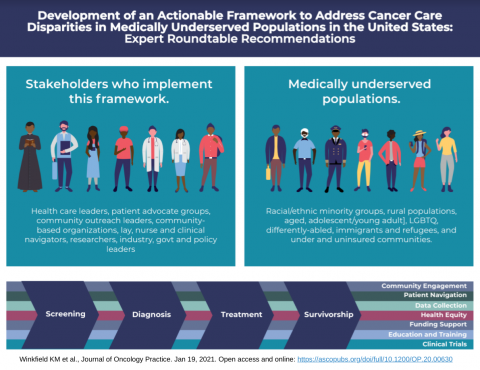Health inequities and disparities in care among the medically underserved persist despite widespread efforts to address them. There are several reasons for this, including conditions in which people live and work, disparities in insurance coverage and access to care, and variable quality of care.
The COVID-19 pandemic and its disproportionate impact on communities of color and other vulnerable populations underscore the critical importance of addressing inequities in health care. The pandemic has exposed long-standing deficiencies in the US healthcare system and has exacerbated disparities in care for other health conditions such as cancer.
Initiatives are underway to address these inequities and improve outcomes for the traditionally underserved, but a holistic approach is needed to develop systemic change that can address barriers and bridge care from one domain to the next.
 To develop this holistic approach, the National Minority Quality Forum’s (NMQF) Diverse Cancer Communities Working Group convened a working group of experts, which included healthcare leaders, cancer disparity and inclusion leaders, patient navigators, cancer community outreach leaders, patient organization leaders, and industry leaders. LUNGevity was honored that Andrea Ferris, LUNGevity’s President and CEO, was asked to serve as an expert as part of the working group.
To develop this holistic approach, the National Minority Quality Forum’s (NMQF) Diverse Cancer Communities Working Group convened a working group of experts, which included healthcare leaders, cancer disparity and inclusion leaders, patient navigators, cancer community outreach leaders, patient organization leaders, and industry leaders. LUNGevity was honored that Andrea Ferris, LUNGevity’s President and CEO, was asked to serve as an expert as part of the working group.
The experts collectively sought to answer the question: What effective strategies, approaches and policies along the is Institute of Medicine/National Academy of Science (IOM/NAS) cancer continuum of care will help local healthcare providers, health systems, researchers, care partners and community leaders facilitate and deliver optimal care for medically underserved populations?
The group identified barriers, notable practices, and recommendations within and between four domains (screening, diagnosis, treatment, and survivorship) of the cancer care continuum to organize an actionable, expert-informed framework to address cancer care disparities in medically underserved populations in the US.
The recommendations were compiled and a framework released in a manuscript entitled “Development of an Actionable Framework to Address Cancer Care Disparities in Medically Underserved Populations in the United States: Expert Roundtable Recommendations,” which has recently been published in the American Society of Clinical Oncology’s Journal of Oncology Practice.
Jeanne Regnante, Chief Health Equity and Diversity Officer, LUNGevity Foundation, convened the expert working group in her previous role as Chair of the Diverse Cancer Communities Working Group, NMQF, and served as corresponding author on the manuscript. Jeanne describes the novelty of the approach and high level findings:
“Expert stakeholders from across the country came together and agreed on the most impactful actions to take that will have, based on their experience, impact in communities that they serve. The recommendations are applicable to many medically underserved communities, including rural populations, LGBTQ, and immigrant populations. LUNGevity is acting on these recommendations to engage vulnerable populations across the lung cancer continuum of care, specifically in areas of health literate education and community engagement. Our hope is that our efforts working with stakeholders will result in better outcomes for the medically underserved lung cancer community.”
Karen M. Winkfield, M.D., Ph.D., Executive Director of the Meharry-Vanderbilt Alliance, who was lead author on the manuscript, describes the importance of the manuscript: “This novel publication will serve as a toolkit to bolster healthcare, navigators and community stakeholder efforts dedicated to patient and community engagement, research, and education,” says Dr. Winkfield. “While the impetus for this paper was cancer health equity, the current COVID-19 pandemic highlights the need for this work across all areas of health and health care.”
Ellen Miller-Sonet, CancerCare, who was a senior author on the manuscript, gives sound advice on the tactical implementation of the framework: “The expert working group proposing this framework has provided concrete advice that we hope will ignite multiple stakeholders to persistently press for health equity in cancer care outcomes in vulnerable communities across the US. The group clearly noted that progress in addressing cancer care disparities should be based not only on what is done, but also how it is done. Unless patients can move along the continuum in a way that is patient-centric, personal and respectful of their values, culture and priorities, their care will be suboptimal and health outcomes will continue to suffer.”
To learn more, download the manuscript from the American Society of Clinical Oncology’s Journal of Oncology Practice now.
Citation: Winkfield KM, Regnante JM, Miller-Sonet E, González ET, Freund KM, Doykos P, on behalf of the Cancer Continuum of Care for Medically Underserved Populations Working Group. Development of an actionable framework to address cancer care disparities in medically underserved populations in the United States: expert roundtable recommendations, Jan 19, 2021, Journal of Oncology Practice. Open access and online @https://ascopubs.org/doi/abs/10.1200/OP.20.00630
LUNGevity was honored to contribute to the manuscript and collaborate with prestigious partners, NMQF, Meharry-Vanderbilt Alliance; CancerCare; Fox Chase Cancer Center / Temple Health; Tufts Medical School; BMS Foundation; FDA Office of Minority Health and Health Equity; Duke Cancer Institute; Icahn School of Medicine at Mt. Sinai; Tuba City, Regional Health Care Corp.; University of Texas, Southwestern; ACCC; Prostate Health Education Network; Pfizer; Equal Hope; Cancer Support Community; Genentech, a member of the Roche Group; Henry Ford Cancer Institute; Stand Up To Cancer; University of San Francisco; National LGBT Cancer Network; GSK; Metropolitan Chicago Breast Cancer Task Force; Takeda; The Smith Center; IRIS, LCC; Patient3i, LLC; Merck & Co. Inc., Sanofi, WSCollaborative, LLC; and Twist Medical, LLC.
